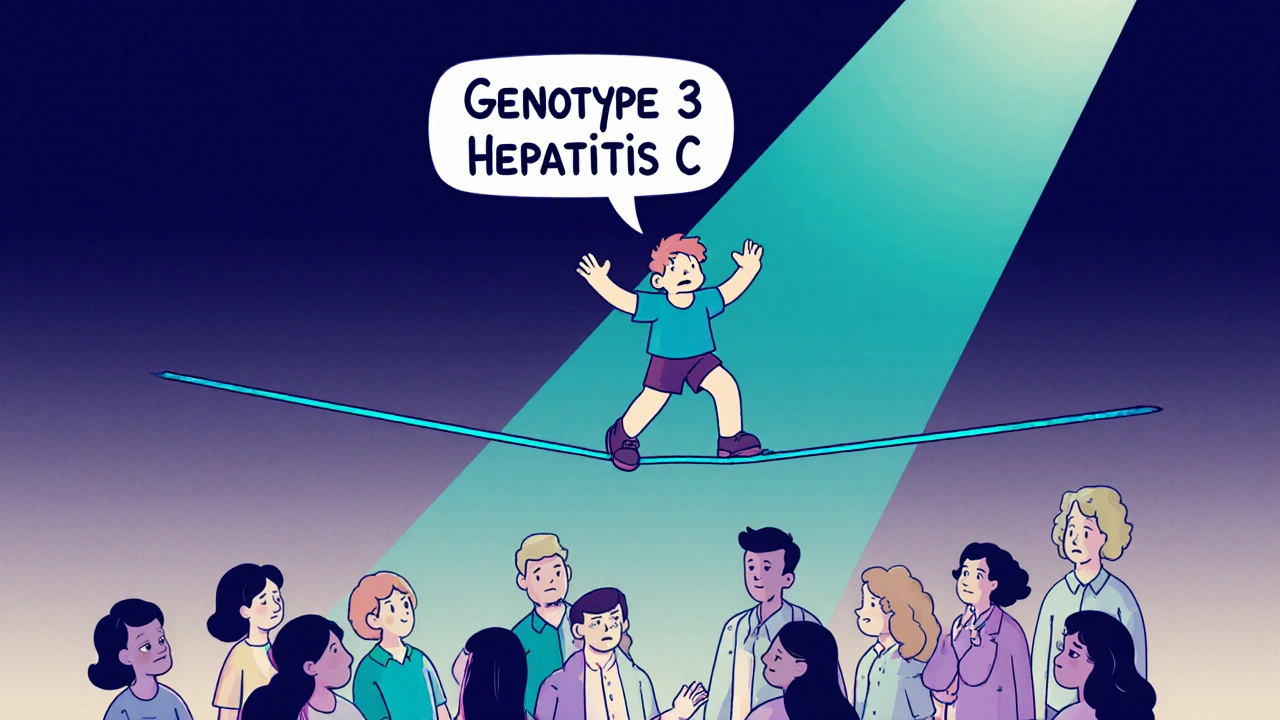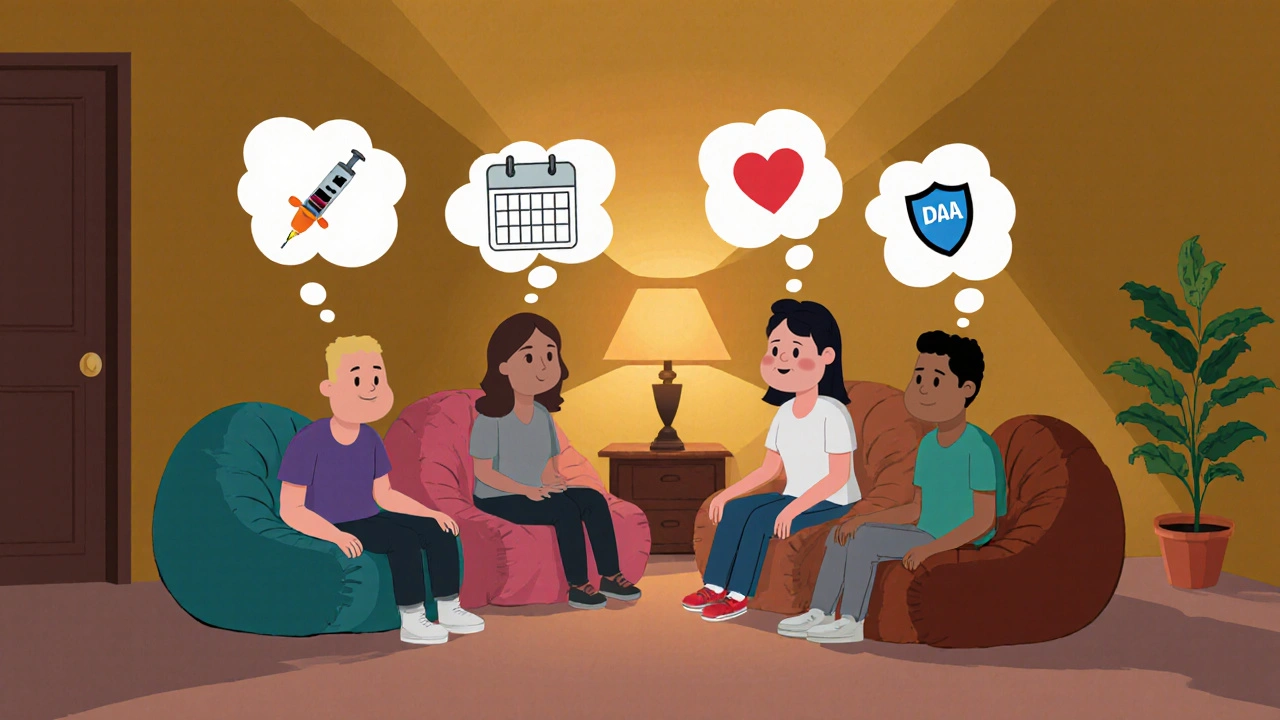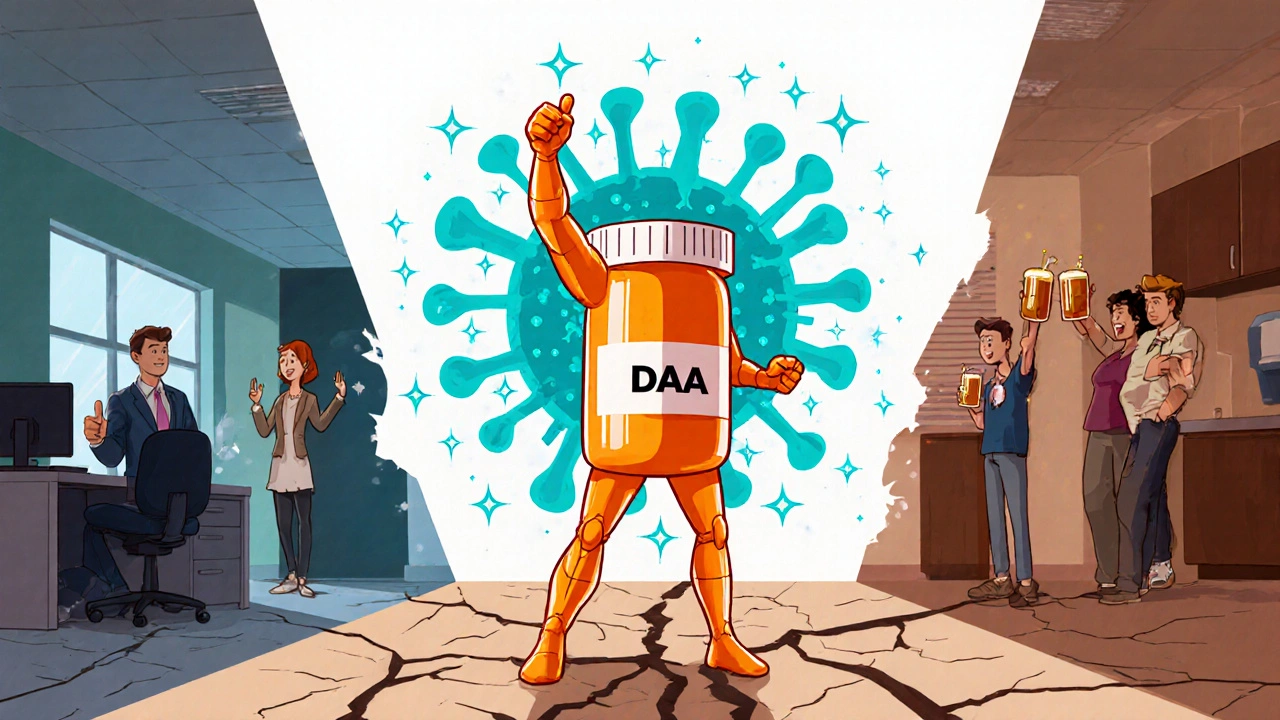 Oct, 22 2025
Oct, 22 2025
Key Takeaways
- Genotype 3 chronic hepatitis C often spreads silently, making disclosure a delicate issue.
- Stigma, mental‑health strain, and treatment side‑effects can erode family, work, and friendship ties.
- Effective communication and early antiviral therapy dramatically improve quality of life.
- Support groups and targeted counselling provide concrete tools for navigating relationships.
- Understanding the medical specifics of genotype 3 helps you anticipate challenges and plan ahead.
Understanding Genotype 3 Chronic Hepatitis C
When you first hear the term genotype 3 hepatitis c, it can feel like medical jargon. In plain terms, it refers to a specific strain of the hepatitis C virus (HCV) that behaves a bit differently from other strains.
Genotype 3 Chronic Hepatitis C is a form of long‑lasting liver infection caused by Hepatitis C Virus genotype 3, which accounts for roughly 30 % of global HCV cases and is especially common in South‑Asia and parts of Europe. While the virus attacks liver cells, the ripple effects reach far beyond your bloodstream.
Key medical points for genotype 3:
- It tends to cause faster progression to liver fibrosis and steatosis (fatty liver) compared with some other genotypes.
- Patients often experience higher rates of insulin resistance, which can complicate diabetes management.
- Modern direct‑acting antivirals (DAAs) achieve cure rates above 95 % even for genotype 3, but treatment may be longer or require specific drug combos.
Understanding these facts matters because they shape how you feel, how you talk about the disease, and ultimately how your relationships evolve.
How the Disease Shapes Social Interactions
Living with a chronic illness isn’t just a medical journey; it’s a social one. The invisible nature of hepatitis C, especially genotype 3, means that friends, partners, and coworkers often don’t see the daily battles you face.
Stigma and Disclosure
Stigma refers to the negative attitudes and discrimination that people with hepatitis C often encounter, fueled by misconceptions about transmission and moral judgement is a powerful force. Because the virus spreads primarily through blood contact-shared needles, unsafe medical procedures, or, rarely, sexual activity-many assume the person must have engaged in risky behavior.
Choosing when and how to tell a partner or an employer can feel like walking a tightrope. Reveal too early, and you risk premature judgment; wait too long, and you risk breaching trust later.
Family Dynamics
Within families, genotype 3 can trigger a mix of concern and fear. Parents may worry about future health complications, while teenage children may feel embarrassed.
Open conversations help prevent resentment. For example, sharing a simple fact sheet about how the virus is transmitted and the effectiveness of DAAs can turn fear into informed support.
Workplace Relationships
Most workplaces lack clear policies on chronic liver disease, leaving employees uncertain about accommodations.
People often hesitate to request flexible hours for medical appointments, fearing they’ll be seen as unreliable. When employers understand that treatment schedules are usually short‑term and that cured patients can resume full duties, they’re more likely to offer reasonable adjustments.

Mental Health Links
Chronic illness and mental health are tightly interwoven. Studies from the World Health Organization show that hepatitis C patients have a 2‑3 × higher risk of depression and anxiety.
Mental Health encompasses the emotional and psychological wellbeing of individuals, affected by stressors such as chronic disease, stigma, and uncertainty suffers when you constantly worry about disease progression, treatment side‑effects, or social rejection.
Depressive symptoms can, in turn, worsen liver outcomes by reducing adherence to medication and healthy lifestyle choices, creating a vicious cycle.
Role of Treatment in Improving Social Life
Since 2016, DAAs have transformed hepatitis C therapy. For genotype 3, regimens like sofosbuvir/velpatasvir or glecaprevir/pibrentasvir offer >95 % sustained virologic response (cure).
Direct‑acting antivirals (DAAs) are oral medications that target specific proteins of the hepatitis C virus, halting its replication and leading to viral clearance are usually taken for 12 weeks, with minimal side‑effects compared to older interferon‑based therapies.
Achieving a cure has three social benefits:
- Reduced Stigma - Once cured, the virus is no longer present, making disclosure less fraught.
- Improved Energy Levels - Allows participation in family activities, travel, and work events.
- Psychological Relief - Removes the constant fear of liver failure, lowering anxiety.
However, the treatment window itself can be a stress point. Scheduling appointments, dealing with insurance approvals, and managing occasional fatigue require planning and communication.
Practical Steps to Manage Relationships
Knowing the medical facts is only half the battle. Here are concrete actions you can take to protect and strengthen your social bonds.
1. Master the Disclosure Conversation
- Prepare a concise script: "I have genotype 3 hepatitis C, a liver infection that’s curable with medication. I wanted you to know because it’s important to me that we’re open about health issues."
- Anticipate questions about transmission, treatment length, and prognosis; have factual answers ready.
- Choose a private, calm setting-avoid crowded, noisy places.
2. Build a Support Network
Support Groups are community‑based or online gatherings where people living with hepatitis C share experiences, coping strategies, and emotional encouragement can be lifesavers. In Australia, groups like Hepatitis C Alliance host monthly meet‑ups in Brisbane and Sydney, both in‑person and via Zoom.
Benefits include:
- Peer validation - you’re not alone in facing stigma.
- Practical tips - medication reminders, diet advice, navigating health insurance.
- Emotional buffer - reduced feelings of isolation.
3. Leverage Professional Counseling
Therapists familiar with chronic illness can teach cognitive‑behavioral techniques to manage anxiety about disclosure and illness‑related stress.
4. Communicate with Employers
When you’re ready, request a meeting with HR. Bring a brief doctor note that outlines needed appointment dates and any short‑term accommodations (e.g., flexible start time).
Many Australian employers follow the Fair Work Act, which protects workers with medical conditions from discrimination.
5. Prioritize Self‑Care
Adopt liver‑friendly habits: balanced diet, regular exercise, limited alcohol, and routine blood tests. A healthier body reinforces confidence in social settings.

Comparison: Genotype 3 vs. Other Hepatitis C Genotypes in Social Context
| Genotype | Typical Regions | Progression Speed (Liver Fibrosis) | Stigma Level (1‑Low, 5‑High) | DAA Cure Rate |
|---|---|---|---|---|
| 1 | North America, Europe | Moderate | 3 | 98 % |
| 2 | South Asia, Africa | Slow | 2 | 97 % |
| 3 | South Asia, Australia, Europe | Fast | 4 | 95‑96 % |
| 4 | East Asia | Moderate | 3 | 96 % |
The table shows why genotype 3 often feels more urgent: faster liver damage and higher perceived stigma push patients to confront social challenges sooner.
Next‑Step Checklist for Living with Genotype 3 Hepatitis C
- Get a confirmed genotype test from your hepatologist.
- Discuss DAA options and schedule treatment.
- Prepare a personal disclosure script for family, friends, and employers.
- Join a local or online support group within the next two weeks.
- Book a session with a counselor experienced in chronic illness.
- Adopt a liver‑friendly lifestyle: balanced diet, regular exercise, minimal alcohol.
Frequently Asked Questions
Can I transmit genotype 3 hepatitis C through casual contact?
No. The virus spreads only through direct blood exposure-sharing needles, unsafe tattoos, or rare medical mishaps. Normal hugging, shaking hands, or sharing food does not pose a risk.
How long does DAA treatment last for genotype 3?
Typically 12 weeks, though some regimens may extend to 16 weeks if there is advanced liver fibrosis or prior treatment failure.
Will my employer have to let me work remotely during treatment?
Australian law protects you from discrimination. You can request reasonable adjustments, such as flexible hours for appointments, but the employer isn’t obligated to provide full remote work unless medically necessary.
What coping strategies help handle stigma?
Educate your close circle with accurate facts, join support groups, and practice assertive communication. Therapy that focuses on self‑esteem also reduces the impact of external judgment.
Is there a risk of liver cancer after curing genotype 3?
Cure greatly lowers the risk, but if you had advanced fibrosis before treatment, regular surveillance imaging is still advised because some risk remains.

Joe Waldron
October 22, 2025 AT 20:17Genotype 3 hepatitis C carries a distinct clinical profile that demands nuanced communication strategies. Because the infection often remains asymptomatic, patients grapple with the decision of when to disclose their status. Early disclosure, when handled with factual clarity, can preempt misunderstandings and reduce stigma. Conversely, premature revelation may trigger unwarranted judgment, especially in environments lacking medical literacy. The advent of DAAs, boasting cure rates above ninety‑five percent, reshapes the social narrative by turning a chronic condition into a curable one; this shift should be highlighted in conversations. Families benefit from simple explanations that the virus spreads only through direct blood contact, not through casual interactions such as hugs or shared meals. Employers, when presented with a concise medical note, are more likely to accommodate flexible scheduling for appointments, thereby preserving workplace productivity. Support groups, whether in‑person or virtual, provide peer validation and practical tips that buffer against isolation; many patients report a marked improvement in mental health after joining. Counseling that incorporates cognitive‑behavioral techniques equips individuals to manage anxiety surrounding disclosure and treatment side‑effects. Lifestyle modifications-balanced diet, regular exercise, and abstaining from alcohol-enhance treatment efficacy and empower patients in social settings. It is essential to prepare a brief script, for example, ‘I have genotype 3 hepatitis C, a curable liver infection; I wanted you to know because transparency matters to me.’ This script can be adapted for family, friends, or employers, ensuring consistent messaging across social circles. When treatment concludes, the viral load becomes undetectable, which dramatically reduces the stigma associated with the disease. Post‑cure, patients often experience renewed energy, enabling fuller participation in social activities that were previously limited. Ultimately, informed disclosure coupled with timely therapy transforms the social impact of genotype 3 from a source of burden into an opportunity for resilience.
Wade Grindle
October 27, 2025 AT 10:24Genotype 3's faster fibrosis progression makes early discussion worthwhile. Clear, jargon‑free explanations about transmission help dispel myths among colleagues. Employers tend to respond positively when presented with a brief medical summary and a proposed accommodation plan. Joining a local support network can also provide practical advice and emotional steadiness.
Joanne Ponnappa
November 1, 2025 AT 01:30Great overview! 😊
Sarah Riley
November 5, 2025 AT 16:37The epigenetic dysregulation inherent to genotype 3 accelerates hepatic steatosis; consequently, psychosocial burden escalates. Therapeutic regimens must therefore be integrated with psychosocial interventions to mitigate compounding morbidity.
Sajeev Menon
November 10, 2025 AT 07:44Thanks for laying that groundwork, Joe. I’d add that using a simple one‑page handout can make the disclosure script less intimidating for patiets. It’s also helpful to practise the conversation with a trusted friend before the real thing – that rehearsal builds confidence. Remember to emphasize that cure rates are high, which often eases family worries. Keep the tone supportive and factual, and you’ll see better engagment.
Emma Parker
November 14, 2025 AT 22:50Hey Wade, love how you kept it straight‑forward! Just a heads‑up – I’ve found that tossin in a quick 'I’m on curable meds' line works wonders at work.
Benedict Posadas
November 19, 2025 AT 13:57Sarah, that was a punchy breakdown! 🚀 The jargon really hits the mark, but let’s not forget the human side – a smile and a supportive hug can cut through the stigma big time. Keep spittin that knowledge, and remember to breathe between appointments. 😅
Jai Reed
November 24, 2025 AT 05:04While I appreciate the supportive tone, we must also demand proactive measures from healthcare providers and employers; complacency is not an option. It is essential to enforce clear policies that guarantee flexible scheduling and non‑discriminatory practices. Moreover, patients should be equipped with legal resources to defend their rights unequivocally.
Tim Blümel
November 28, 2025 AT 20:10Jai, your call for action reminds us that health isn’t just a personal journey but a collective responsibility. 🚀 When we align medical advances with social justice, the ripple effects extend far beyond the clinic walls. 🌍 Let’s keep the conversation alive, and watch how empathy reshapes our communities. 😊